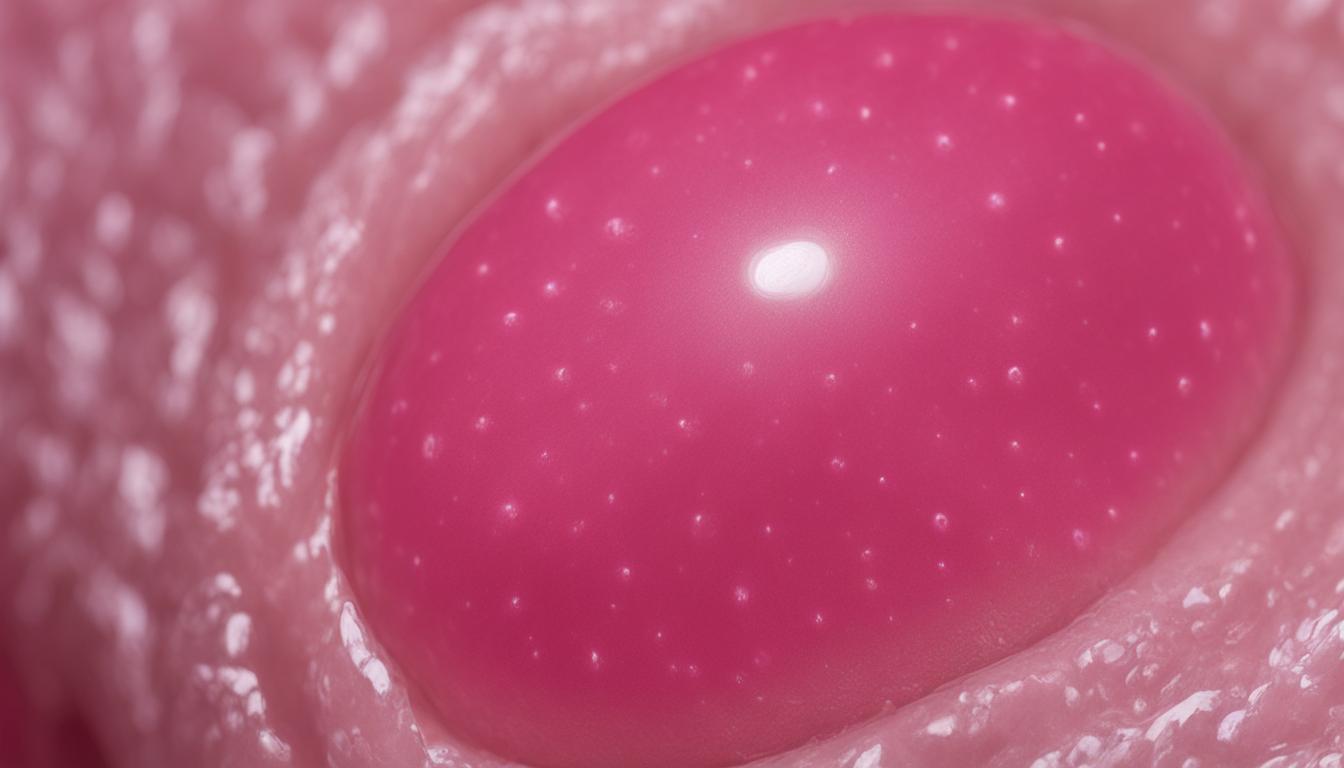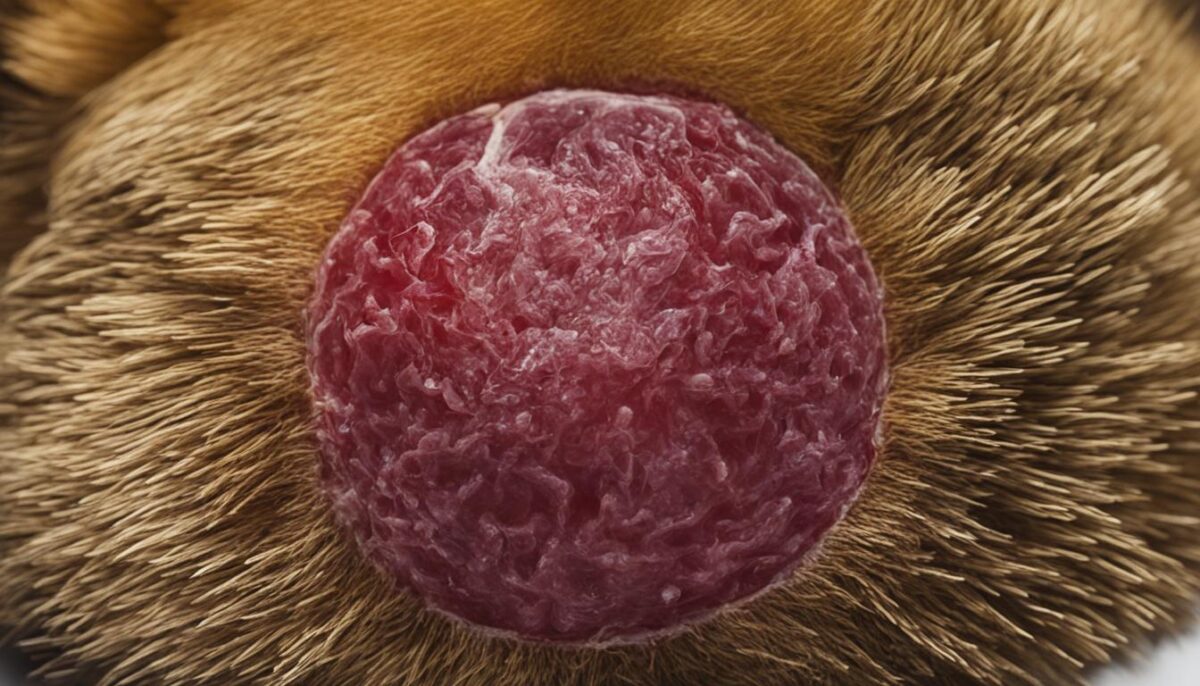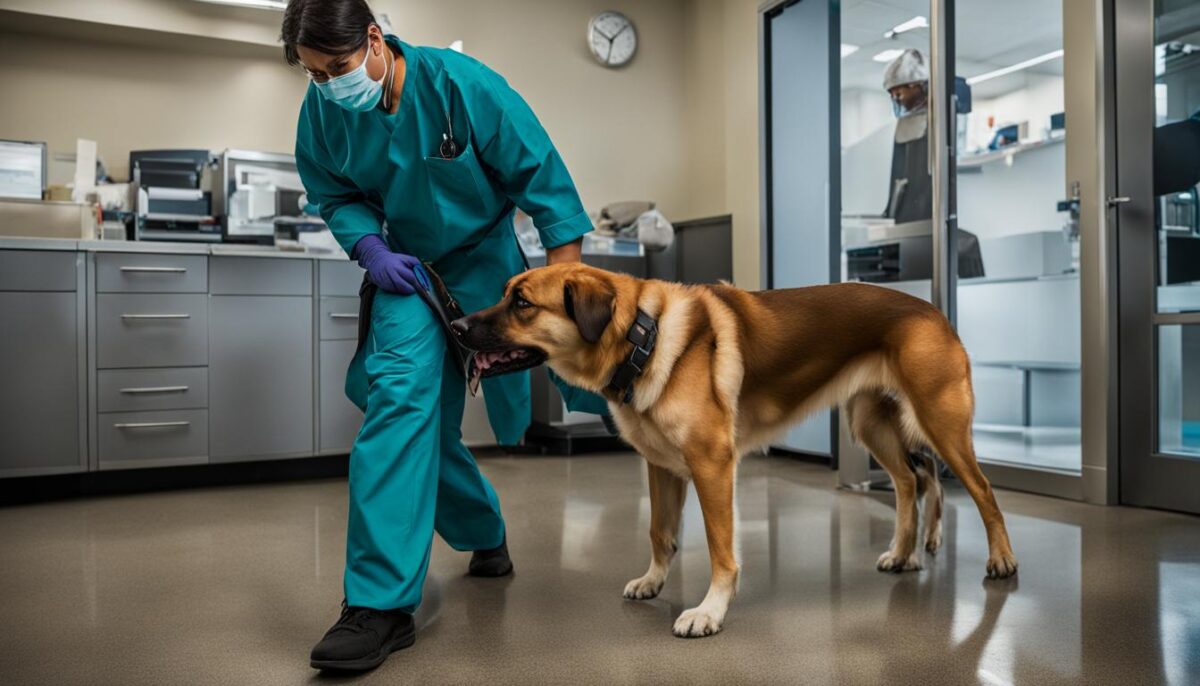When you love your dog, you want to know all about keeping them happy and healthy. You’ve probably heard of “blue balls” for humans, but what about our furry friends? Canine wellness is different than people’s, and pet health can sometimes be a tricky thing to figure out.
Let’s talk about something not many people talk about: dog reproductive health. Even if it might make us blush, it’s important. Male dogs have their own set of health stuff to deal with, especially down there. “Blue balls” might be a term you’ve heard, but it doesn’t really happen to dogs. But, they can have unusual colors there if they have health problems, like testicular conditions in dogs, that we need to watch out for.
As a caring pet owner, it’s up to you to spot the signs that something isn’t right with your dog’s health. If you see anything odd, like darker colors where it shouldn’t be, don’t just ignore it. It’s time to act and help your dog feel better.
Key Takeaways
- Dogs can’t get “blue balls”, but they can have other testicular conditions.
- Unlike people, doggie parts work a bit differently, so their pet health needs special care.
- Dark or blue colors on your dog’s testicles are a sign to pay attention to.
- Keeping an eye on your dog’s health means sometimes checking places you might not think about.
- If you see something that doesn’t look right, your vet is the best person to help your dog.
Understanding Canine Reproductive Health
Did you know that dogs have a very special way their bodies work when it comes to making puppies? It’s different from how people work, and knowing this can help you take better care of your furry friend. You need to be smart about their sexual health in dogs because it’s a big part of keeping them happy and healthy!
Physiological Differences in Dogs
Just like us, dogs have their own unique body systems. This is called canine physiology. It’s how their bodies work! When it comes to making puppies, their dog reproductive system does not work the same as humans. Have you ever heard of the term “blue balls” for people? It’s something that doesn’t happen to dogs. They can’t get it because their bodies are not built that way. So, when we look after our four-legged pals, we must remember that they are different from us.
Common Testicular Problems in Dogs
Doggy boys have these things called testicles. They are part of how they help make puppies. But sometimes, they can get sick. There’s something called testicular health we need to think about. Dogs can have problems like infections or their testicles might twist in a way that really hurts them. If you see that your dog’s testicles look different, like they have changed color, it’s not because of “blue balls.” It might be a sign they need to see the vet.
The Misconception of Blue Balls in Dogs
Some people might think that dogs can get “blue balls” just like humans. But this is not true. It’s a pet health misconception. That’s when we believe something about our pets that isn’t right. If a dog’s testicles are blue, it might be because they have a serious problem. So, it’s very important to know the truth so we can help our dogs if they need it.
Remember, knowing about your dog’s health is like being a detective. You need to look for clues and learn the facts so you can be the best pet owner you can be!
Identifying Testicular Infections in Dogs
If your furry friend is feeling under the weather, it’s important to watch out for signs of testicular infection in dogs, also known as orchitis. This is not something to take lightly, as identifying dog illnesses early can make a huge difference in treating your pet.
Causes of Testicular Infection (Orchitis) in Dogs
Many things might cause orchitis in dogs. It can start with bacteria getting into the blood, urine, or through secretions from the prostate gland. These are the unseen enemies that could lead your dog to get sick. So keep a careful watch!
Symptoms to Watch For
What should you look out for? Here’s a quick guide:
- Lethargy or acting more tired than usual
- Fever, which means your dog might feel hotter than normal
- Not wanting to eat much
- Swollen testicles that may show a change in color
If you notice these signs of orchitis, it’s a sign to take action and care for your pet’s health.
When to Consult Your Veterinarian
It’s simple: if you see any unusual signs, especially the ones mentioned above, it’s time to visit the vet. They know just what to do to check if your dog has an infection like orchitis and can help your dog feel better. Remember, getting help early is key to keeping your dog happy and healthy!
Testicular Torsion: A Painful Emergency for Dogs
If your dog is facing a scary health problem called testicular torsion, it means something very painful is happening. The testicle gets twisted up and the blood can’t flow right. This hurts a lot and your dog might get really sick. It’s a real emergency, kind of like if you suddenly had a really bad stomachache and needed a doctor quickly.
What is Testicular Torsion in Dogs?
Think of it like this: your dog has a body part that gets knotted up and all the roads for blood to travel through get closed off. This twist happens in the cords that hold the testicles, and it stops the blood, which is very bad. The testicle can’t get any oxygen, and without quick help, it can get seriously damaged.
Recognizing the Signs: Symptoms of Torsion
Knowing the signs of testicular torsion can save your buddy. Here’s what to look for:
- Throwing up
- Not moving much or at all
- No interest in playing or eating
- Being really still or not wanting to move
- Parts of the body near the back legs turning a weird color
These symptoms of torsion are warning flags. Your dog might feel so bad they can’t even tell you what’s wrong. That’s when you step in and get help.
The Importance of Immediate Veterinary Care
Remember, this is a race against time. Emergency pet care is a must. If you see any of the signs we just talked about, don’t wait. Taking your furry friend to the vet right away is super important. The vet knows what to do, and they might have to do a surgery to fix the twist and make sure your dog is okay.
Keep in mind, even when it looks like a small thing, it can turn into something big quickly. Never think you’re making too much fuss — it’s better to be safe than sorry when it comes to recognizing dog emergencies. Taking action fast and getting veterinary attention can make sure your dog gets better and is back to wagging tails in no time!
Can Dogs Get Blue Balls?
Hey there! You might have heard someone joke about dogs getting blue balls. But let’s clear things up a bit. The story about canine blue balls is just a myth. Dogs don’t get blue balls like humans do. If you see that your dog’s testicles are turning blue, it’s not because of the same reason it would happen to people. It’s super important to understand dog health, so we don’t believe in this kind of pet care myths.
When a dog’s testicles look blue, it actually might be a sign that something not-so-good is going on. This can be a real health problem like an infection or something called torsion. Torsion sounds a bit tricky, but it just means that a testicle got twisted around, which can be very ouchy for your furry buddy. Both of these things are serious, and you would need to go to the vet right away. Taking care of your buddy’s dog testicular health is part of being a great pet owner!
| Myth Fact | What It Means for Your Dog |
|---|---|
| Blue Balls in Dogs | Not caused by prolonged arousal but a sign of an actual medical issue |
| True Blue Discoloration | Might indicate infection (super bad) or torsion (mega ouchy) |
| Pet Care Rumors | Not anything to do with true dog health; always check with a vet |
So, now you know! If you hear someone talking about dogs and blue balls, you can tell them it’s just a big ol’ fairy tale. It’s more important to keep an eye out for your pet’s health than to fall for these myths. Stay smart about what really affects your dog and always spread the truth!
Treating Testicular Conditions: From Antibiotics to Surgery
If your furry friend is facing a testicular condition, you might be worried about the best way to help. The good news is that there are many ways to treat these problems. The right treatment will depend on what’s going on with your dog.
For infections, vets often suggest antibiotics for dogs. They can get rid of the germs making your dog sick. If your dog is in a lot of pain or the infection is really bad, other medicines can help, like ones to stop swelling or kill fungal infections. It’s super important to follow what your vet says, so your dog can get better quickly.
Sometimes, if the problem is really serious, a surgery for dogs might be needed. This might sound scary, but vets are good at these operations. They will do their best to make sure your dog gets healthy again. Canine surgery can fix the problem and stop more bad things from happening to your pup.
After treatment, your job is to take care of your dog. Giving your dog the medicine on time, keeping them comfy, and going back to the vet for check-ups are all part of dog health management. This helps your dog heal and stay happy!
| Condition | Medications | Surgery | Follow-Up Care |
|---|---|---|---|
| Infection | Antibiotics, Anti-inflammatory, Antifungal | Rarely Required | Regular check-ups, Medication adherence |
| Torsion | Pain Management | Often Necessary | Careful monitoring, Rest, Vet Visits |
| Advanced Conditions | Depends on Specific Illness | Possible Testicle Removal | Post-operative care, Recovery monitoring |
Remember, every dog is unique. If you’re ever unsure about what to do for your dog’s health, always ask your vet. They’re the experts in testicular condition treatments and will know just what your dog needs.
Prevention: Assessing the Benefits of Neutering Your Dog
Keeping your furry friend healthy is a big part of being a good pet owner. One key step you can take is considering neutering your dog. It’s not just about preventing puppies; it’s also a move that can protect your dog from certain health risks.
Long-Term Health Benefits of Neutering
When you neuter your dog, you’re helping to keep them safe from some serious health problems. Neutering benefits your dog by reducing the risk of certain cancers and illnesses. It can also help your dog live a longer, healthier life. This means more years for you and your dog to spend time together!
Understanding the Neuter Procedure
The neuter procedure is a surgery that your vet can do to help prevent your dog from having puppies. Don’t worry; it’s a common surgery, and many dogs have it done. Vets are really good at this, and they’ll take great care of your dog. Your dog will be given medicine to help them sleep during the surgery, so they won’t feel a thing. Afterward, your dog will need some rest, but they’ll be back to their playful self soon.
Alternatives and Considerations for Breeders
If you have a purebred dog and you’re thinking about breeding, there’s a lot to consider. It’s not just about having cute puppies. As a breeder, you have to think about the health and safety of the mom and the pups. Canine health prevention is a big job for breeders, too. You’ll need to ensure the dogs you’re breeding are healthy and that you can find good homes for all the puppies. Sometimes, even for breeders, neutering can still be the right choice, especially if it means a healthier life for the dog.
| Advantages of Neutering | Considerations for Breeders |
|---|---|
| Decreases risk of testicular cancer | Need to maintain breed standards |
| Prevents unwanted litters | Potential genetic health screening |
| Can reduce aggressive behavior | Investment in caring for breeding dogs |
| Reduces roaming and territory marking | Ensuring puppies have safe, happy homes |
Talking to your vet can help you make the best choice for your dog. Whether you decide to neuter your dog or consider breeding, the most important thing is your dog’s health and happiness. That’s what being a pet owner is all about!
Conclusion
As a smart pet owner, it’s important for you to know about your dog’s health. When you have better canine health awareness, you can take care of your dog much better. We talked about how to spot when dogs might have problems with their testicles, like infections or twists called torsions. These are serious and your dog needs to see the vet right away.
Responsible pet ownership also means preventing health issues before they happen. One big step is thinking about neutering your dog. This can help stop some health problems from starting. Always keep your eyes open for any signs that your dog might not be feeling well. If something seems wrong, go to the vet.
Keep these pet health tips in mind, and you’ll do a great job caring for your furry friend. Always remember, taking the time to really understand dog testicular problems helps you take action fast and keep your dog happy and healthy! Remember, you have a big part in making sure your dog has a joyful life by your side.
FAQ
Can dogs develop the same blue balls condition as humans?
No, dogs cannot develop blue balls or epididymal hypertension as it’s uniquely a human condition. Canine reproductive physiology operates differently, making this condition not applicable to dogs.
What does discoloration of a dog’s testicles indicate?
Discoloration of a dog’s testicles might be mistaken for blue balls, but it usually signals a serious health issue like testicular torsion or infection (orchitis), requiring immediate veterinary attention.
How can you tell if your dog has a testicular infection?
Signs of testicular infection in dogs can include swelling, discoloration, lethargy, fever, and loss of appetite. If you notice these symptoms, contacting your veterinarian promptly is crucial.
What is testicular torsion in dogs, and why is it an emergency?
Testicular torsion occurs when a dog’s testicle twists around the spermatic cord, cutting off blood flow. It’s an emergency because it can cause severe pain, discoloration, and other distressing symptoms like vomiting and inactivity, and requires immediate veterinary care.
Is the concept of blue balls in dogs a real medical issue?
No, the concept of blue balls in dogs is a myth. True blue discoloration of the testicles in dogs indicates other serious health problems that need to be addressed by a professional.
How are testicular conditions in dogs treated?
Treatment varies depending on the underlying cause. Antibiotics, anti-inflammatory and antifungal medications may be used for infections, while surgical intervention is typically necessary for testicular torsion. Your vet will determine the best treatment plan for your dog’s condition.
What are the benefits of neutering your dog?
Neutering your dog can provide numerous long-term health benefits, such as preventing testicular cancer and other reproductive issues. It often leads to better overall canine wellness and behavior.
Should breeders consider neutering their purebred dogs?
Breeders might opt not to neuter to maintain breeding lines. However, understanding the pros and cons, including the risk of testicular problems, is important for making informed decisions about the health of the breeding dogs.
When should you consult a veterinarian for testicular issues in your dog?
You should consult your veterinarian as soon as you notice any signs of testicular issues such as swelling, discoloration, lethargy, or any change in behavior. Early detection and treatment are key to your dog’s health.


